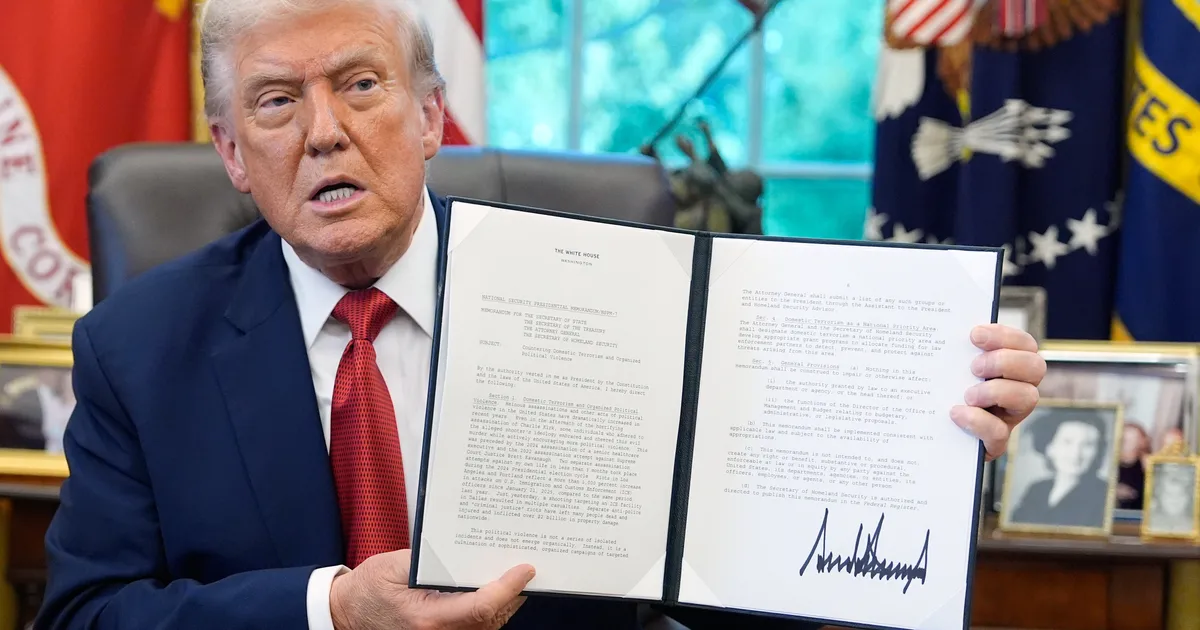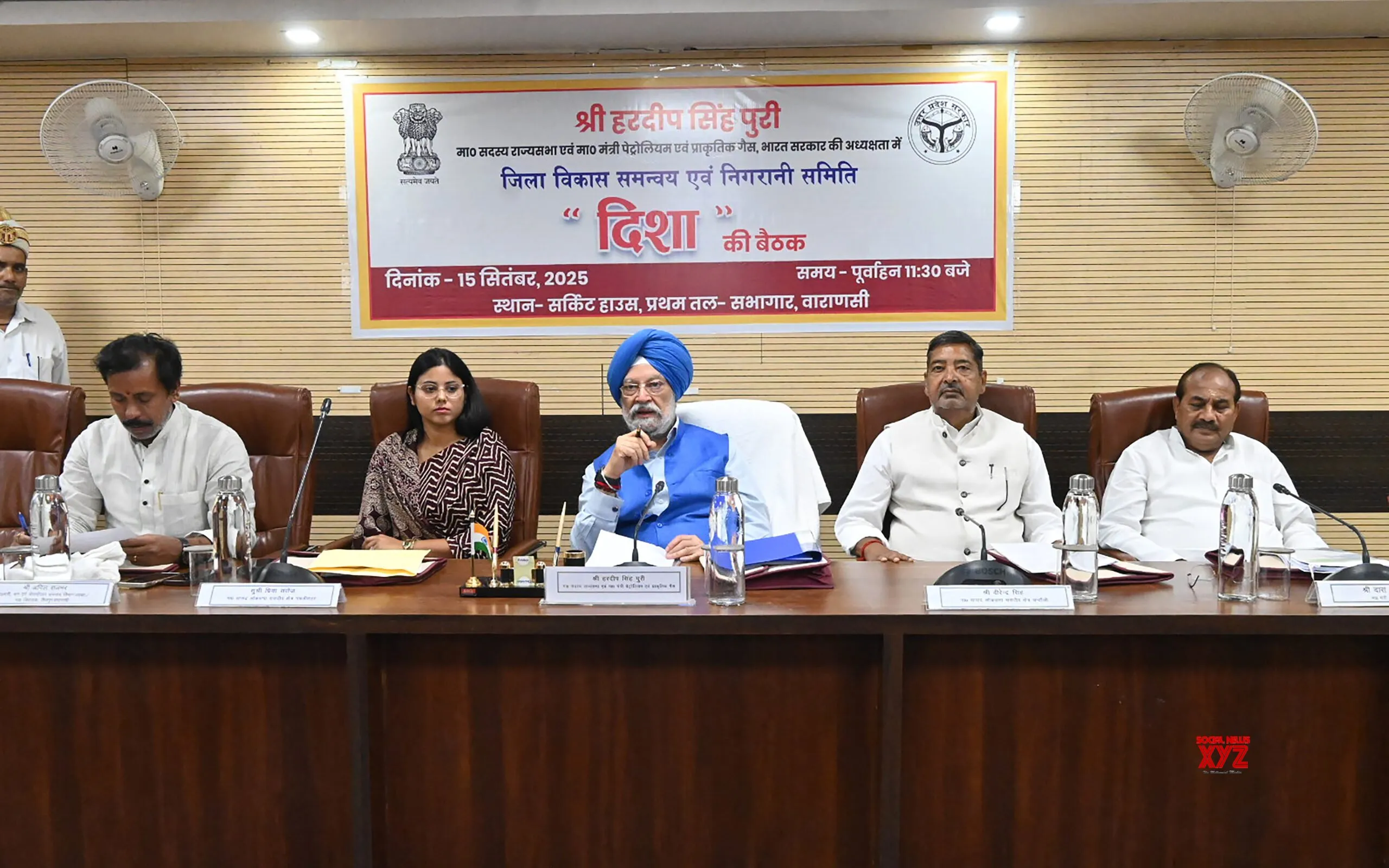
LOADINGERROR LOADING
The Trump administration’s promised crackdown on domestic political opponents following the murder of conservative activist Charlie Kirk arrived Thursday night in the form of a presidential memo directing the executive branch to take a whole-of-government approach to combating what it calls “domestic terrorism.”
But what does Trump mean by “domestic terrorism”? Well, that’s what’s alarming.
In the memo, Trump sweeps together speech and association into its definition of domestic terrorism: It seeks to blame speech by individuals and organizations opposed to the Trump administration’s policies for the actions of disparate actors, like recent lone-wolf shooters and protesters, and targets funding “networks” that supposedly fuel such speech.
Advertisement
It augurs the worst crackdown on political dissent in generations. And importantly, it targets not only the dissent itself, but the groups and structures that enable dissenters to organize and be heard.
“The things they are doing, I haven’t seen government actions like this in my lifetime,” said Katie Fallow, deputy litigation director for the Knight First Amendment Institute at Columbia University. “The most recent analogies would be from either Nixon or the Red Scare.”
The memo starts by linking the recent “political” assassinations of Kirk and United Healthcare CEO Brian Johnson to the 2024 assassination attempts against President Donald Trump, protests against Immigration and Customs Enforcement operations in Los Angeles and Portland, Oregon, an aborted assassination plot against Supreme Court Justice Brett Kavanaugh in 2022 and the shooting at an ICE detention center that left one immigrant detainee dead as “a culmination of sophisticated, organized campaigns of targeted intimidation, radicalization, threats, and violence.” (Notably, the memo does not mention the recent shootings of Democratic lawmakers in Minnesota or any other violence targeting Democrats.)
Advertisement
These “organized campaigns” are “designed to silence opposing speech, limit political activity, change or direct policy outcomes, and prevent the functioning of a democratic society,” the memo states. Defeating them requires the government to adopt “a national strategy to investigate and disrupt networks, entities, and organizations that foment political violence.”
To summarize: “Radicalization” that aims to “change or direct policy outcomes” or speech that “foment[s] political violence” is domestic terrorism that must face the full force of the federal government, the memo asserts. In short, according to the administration, words are violence.
Advertisement
So what kind of speech is now subject to a person or entity potentially being deemed a domestic terrorism threat? Anyone who espouses “anti-Americanism, anti-capitalism, and anti-Christianity; support for the overthrow of the United States Government; extremism on migration, race, and gender; and hostility towards those who hold traditional American views on family, religion, and morality,” is subject to suspicion, the memo states.
Those targeted thoughts are “worded in a vague and broad way,” Fallow said, in a manner that is “aimed at giving the government enough leeway to go after individuals and orgs on the left that it disagrees with under the guise of combating violence.”
“It’s incredibly chilling,” said Will Creeley, legal director for the Foundation for Individual Rights and Expression, a free speech nonprofit group. “The executive order identifies a list of viewpoints that the administration doesn’t like and suggests that those viewpoints in and of themselves result in illegal activity and thus can be grounds for investigation and targeting of a whole-of-government effort to investigate and push back against them.”
Advertisement
The target is Trump’s political opposition. The memo explicitly states that groups espousing “extremism on migration, race, and gender” are under suspicion as supporters of domestic terrorism. Some in the White House have gone even further, with deputy chief of staff Stephen Miller stating that merely calling the Trump administration’s actions “authoritarian,” as California Gov. Gavin Newsom did, “incites violence and terrorism.”
The goal is to chill speech with threats backed by the force of the federal government. Where those threats don’t work, it aims to disable the funding of any group that opposes the administration’s policies.
Vice President JD Vance said as much in the aftermath of Kirk’s death when he declared it was time to “go after the NGO network that foments, facilitates and engages in violence.” The vice president specifically mentioned billionaire investor George Soros’ Open Society Foundations and the Ford Foundation, which funds a vast number of progressive and human rights groups in the U.S. and around the world, as targets.
Advertisement
“They are trying to make it impossible for progressive organizations to operate and stage a small-d democratic resistance to what the administration is doing,” said a source familiar with internal deliberations of progressive nonprofit groups that fear being targeted.
It is important to see this domestic terrorism memo as the underpinning of a forthcoming effort to destroy not just the groups named by Vance, but any other nonprofit funding left and liberal causes.
Advertisement
The Department of Justice has already begun shopping potential charges to be levied against the Open Society Foundations to various U.S. attorney offices, according to the New York Times. These proposed charges of “racketeering, arson, wire fraud and material support for terrorism,” according to the Times, stem from a research memo put together by the conservative communications firm Capital Research Center alleging that the Open Society Foundations gave tens of millions of dollars to dozens of “pro-terrorist” and “pro-violence” nonprofits.
The allegations made in the report are almost entirely rooted in groups’ expression of support for Palestine amid the Israel-Palestine conflict. This includes support for Palestinian causes, association with Palestinian groups or persons that have been alleged to have some connection to the People’s Liberation Front for Palestine, a Marxist-Leninist group the U.S. has designated as a foreign terrorist organization, or, in some instances, expressions of support for, or justifications of, Hamas’ attack on Israel on Oct. 7, 2023.
These views are likely objectionable to some people. But it’s not illegal to express views many people may find offensive.
Advertisement
“The First Amendment protects a wide, wide range of speech that many, most or even all Americans would find offensive,” Creeley said. “The government doesn’t get to make up our minds for us.”
Meanwhile, nonprofits operating in Palestine that have received grants from the Open Society Foundations are accused of association with international terrorist groups. These allegations are tenuous at best, including targeting the Open Society Foundations funding for Al-Haq, a Palestinian human rights group, over its questionable designation as a terrorist organization by Israel, not the U.S. (The Trump administration sanctioned Al-Haq in August for its support of the International Criminal Court’s indictment of Israeli President Benjamin Netanyahu on war crimes.)
Advertisement
But, read together, Trump’s executive memo on domestic terrorism appears to create a legal directive to turn the allegations in the research memo on the Open Society Foundations into a legal structure for suppressing political dissent.
How an investigation, prosecution or other effort to punish an organization under this memo would proceed remains unclear. Vance alluded to stripping nonprofit groups like Open Society and the Ford Foundation of their tax-exempt status. And the memo directs the IRS to investigate nonprofits for their alleged connections to domestic terrorism, and to refer such groups to the Department of Justice for prosecution.
It also directs the Treasury Department to “deploy investigative tools, examine financial flows, and coordinate with partner agencies to trace illicit funding streams” and to work with financial institutions to require them to file Suspicious Activity Reports for certain groups’ banking operations. That raises the possibility of pressuring banks to shutter or freeze accounts from nonprofits or other groups that the administration labels as supporters of domestic terrorism.
Advertisement
“The biggest concern is that, if you are an organization that is declared as a terrorist supporting organization, you are going to immediately lose all of your bank accounts,” said the source with knowledge of progressive nonprofits’ internal deliberations.
All of this will likely end up in the courts, where First Amendment precedent stands in stark opposition to any government suppression of political dissent. Even the Supreme Court’s conservative supermajority, which has generally been sympathetic to Trump, has strongly sided with protections for the kind of core political speech targeted by Trump’s memo.
TruthSavesLives
Your SupportFuelsOur Mission
Your SupportFuelsOur Mission
Dangerous myths about medicine spread fastest when watchdogs are silenced. Become a member today and help us safeguard science, protect health, and keep the public informed.
We remain committed to providing you with the unflinching, fact-based journalism everyone deserves.
Thank you again for your support along the way. We’re truly grateful for readers like you! Your initial support helped get us here and bolstered our newsroom, which kept us strong during uncertain times. Now as we continue, we need your help more than ever. We hope you will join us once again.
We remain committed to providing you with the unflinching, fact-based journalism everyone deserves.
Thank you again for your support along the way. We’re truly grateful for readers like you! Your initial support helped get us here and bolstered our newsroom, which kept us strong during uncertain times. Now as we continue, we need your help more than ever. We hope you will join us once again.
Support HuffPost
Already contributed? Log in to hide these messages.
“If they go after organizations that they say are supporting certain radical ideas and try to criminalize these groups, they would fail because it would be protected by the First Amendment,” Fallow said. “But the existence of this action chills speech.”



